It takes courage to grow up and become who you really are.
Savor & Share
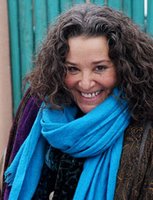 Poetry opportunities, they call. So much to create and explore. These ones are so good, I’ve got to share:
Poetry opportunities, they call. So much to create and explore. These ones are so good, I’ve got to share:
Judyth Hill – my first poetry instructor and favorite role model – is leading a two-day poetry workshop in Mexico next month. Don’t miss this. The author of six books of poetry, Judyth has been aptly described as "energy with skin.” That’s no overstatement. Her creative energy, combined with her expansive writing career (poet, teacher, baker, food writer), invites and encourages liberation, invigoration and celebration.
Poetry Writing: The Sweet Ecology of Manuscripts
Feb. 23 - 24, 2009
San Miguel de Allende, Mexico
More details here.
• • •
On another note, and closer to home (well, my home, anyway), Declaration Editing seeks an intern to lend a hand with Four and Twenty, its short form poetry journal. The internship is unpaid, but the lucky helper gets to, among many things, sort through poetry submissions. (It’s the voyeur in me that goes giddy at the chance to sneak peeks at the work of others). And, best of all, thanks to our widening world of email and such, you can intern from the comfort of your own home. So Jetsons!
Go here for more.
• • •
Speaking of home — and the increasing ease of laptop living — now you can take part in a writing workshop without getting out of bed. Poetry for the People email class starts March 11.
In this six-week class, Portland poet Sage Cohen offers six lessons with six assignments completed in six weeks. The class is designed to boost and support writers of all levels and experience. I took this class last year and it provided much-needed focus and structure.
Get going, go here.
Where were you?
Yesterday, during the Presidential Inauguration of Barack Obama, I was in an airport terminal, huddled around a small tv with low volume and a cutting glare. A small band of us were waiting for a plane but fixed to the image of a man, and a moment, who made history while easing us from a painful past.
The concourse was hushed as the 44th president took the oath and addressed the crowd in a speech that carried the power of poetry.
The flight was on time and I rushed my way to a window seat, missing Elizabeth Alexander’s Inaugural Poem. Did you catch it? Did the words sing to you?
Alexander is just the fourth poet to read at a presidential inauguration, and she joins poets Robert Frost, Maya Angelou and Miller Williams. That Obama chose to include poetry on the momentous day speaks of a man, and a leader, who values the arts and the creative inspiration words can bring.
Praise Song for the Day
Elizabeth Alexander
A Poem for Barack Obama's Presidential Inauguration
Each day we go about our business,
walking past each other, catching each other's
eyes or not, about to speak or speaking.
All about us is noise. All about us is
noise and bramble, thorn and din, each
one of our ancestors on our tongues.
Someone is stitching up a hem, darning
a hole in a uniform, patching a tire,
repairing the things in need of repair.
Someone is trying to make music somewhere,
with a pair of wooden spoons on an oil drum,
with cello, boom box, harmonica, voice.
A woman and her son wait for the bus.
A farmer considers the changing sky.
A teacher says, Take out your pencils. Begin.
We encounter each other in words, words
spiny or smooth, whispered or declaimed,
words to consider, reconsider.
We cross dirt roads and highways that mark
the will of some one and then others, who said
I need to see what's on the other side.
I know there's something better down the road.
We need to find a place where we are safe.
We walk into that which we cannot yet see.
Say it plain: that many have died for this day.
Sing the names of the dead who brought us here,
who laid the train tracks, raised the bridges,
picked the cotton and the lettuce, built
brick by brick the glittering edifices
they would then keep clean and work inside of.
Praise song for struggle, praise song for the day.
Praise song for every hand-lettered sign,
the figuring-it-out at kitchen tables.
Some live by love thy neighbor as thyself,
others by first do no harm or take no more
than you need. What if the mightiest word is love?
Love beyond marital, filial, national,
love that casts a widening pool of light,
love with no need to pre-empt grievance.
In today's sharp sparkle, this winter air,
any thing can be made, any sentence begun.
On the brink, on the brim, on the cusp,
praise song for walking forward in that light.
Kaylin, who are you?
God Says Yes to Me
Kaylin Haught
I asked God if it was okay to be melodramatic
And she said yes
I asked her if it was okay to be short
And she said it sure is
I asked her if I could wear nail polish
Or not wear nail polish
And she said honey
She calls me that sometimes
She said you can do just exactly
What you want to
Thanks God I said
And is it okay even if I don't paragraph
My letters
Sweetcakes God said
Who knows where she picked that up
What I'm telling you is
Yes Yes Yes
I ran across this poem a few years ago In the Palm of your Hand, a poetry workbook by Steve Kowit (1995, Tilbury House Publishers).
Since then, I've shared it with many friends and writers, and have seen it posted on numerous websites and blogs. It's a great poem, full of sass and insight, but I have yet to discover additional work or information about its author Kaylin Haught.
In this age of Google and Facebook and instant knowledge of anything, anytime, I want more. Who is Haught? Do you know Haught? Has she other great poems? Kaylin, are you out there?
Bright ribbon unspooling
When the poetry is working, it doesn't feel so much that I'm crafting it as that it's presenting itself. Of course it's not often like this, but it has been -- the bright ribbon of the poem unspooling in my mind and waiting while my fingers fasten it to the paper. I've had that. God, I've had that.
I’ve had it, too. Not lately. Not now. Instead, I have this:
Things to do
Check email. But don’t respond. To respond means you are engaged and engagement reveals the charade of writing.
Research poems. Look for the William Stafford poem you heard while listening to someone else’s more interesting conversation. Go to Google and discover, a half hour later, that the poem has no online home. You must buy the entire book. Contemplate an order. Recall your credit card balance. Rethink your instinct. Go back to search of poem. Read others, but quickly because you are supposed to be writing.
Go to Facebook. See if your ‘friends’ are doing anything you don’t know about, want to know about, slightly care about. Berate yourself for indulging in trivial distractions.
Hear other poets. Listen to readings of little-known poets in little-known places and wish it were you. Remember that they spent hours writing and reading and writing more. Look at your empty page. Compare and despair.
Eat. Reconsider breakfast. Cereal. And a spoonful of peanut butter. And a Diet Coke.
While wiping the kitchen counter, remember the load of jeans in the washer, the whites in the dryer. Fold the towels. Consider the stack of shirts to iron. Walk away.
Feel the pressure of a New Year. Revisit the vow to write more and eat less. Recognize the luxury of time. Kick yourself for wanting, wasting, complaining.
Turn off computer, or just the email. For one full day — okay, one hour.
Check email one last time.
Pick up pen. Don’t think. Forget and forgive, all you are, all you want to be.
— Drew Myron
To love, to try
Or can you love some more?
— Michael Franti and Spearhead
Is love enough? from Yell Fire!
Traveling along Hwy 101 with the ocean at my side, I always crank the sound on this song. Twice a week, I drive to Seashore Family Literacy to share the joys of reading and writing with giddy grade-school girls, awkward middle school kids, and searching adolescents.
Is love enough
Or can you love some more?
It goes on and on and on and
on and on for a thousand years
What language are your tears?
We meet in the Writing Studio — not a classroom — and I don’t consider myself a ‘teacher.' Something more occurs. A fellow volunteer says he is haunted by the kids and I may be, too. Each session I go home full, holding words, struggles, sorrows and joys. My mind works every name and conversation in a sort of prayer, the way you worry a small stone in your palm until you know every contour and angle, every thin crack.
Genuine sharing stretches and marks your heart. Love isn’t enough. You feel capable of more.
The other day an ad caught my eye. January is National Mentoring Month and to promote its campaign ServiceNation.org wisely used an excerpt from a speech Barack Obama made last summer:
We need your service, right now, in this moment— our moment— in history. I’m not going to tell you what your role should be; that’s for you to discover. But I am going to ask you to play your part; ask you to stand up; ask you to put your foot firmly into the current of history.
Volunteer work is not just about giving. The emphasis on service is only part of the story. It’s not what I can contribute but what I get in return, time after time, week after week.
Like life, not every volunteer moment is stellar. The movies get it wrong, with the cliche of the man in the soup line who beams a toothless smile, or the child who masters reading and all turns well in her world. Some days are that great, and everyone goes home happy.
But most of the time, real change is slow and quiet. Often my efforts seem small and futile but I still go home satisfied that I am a small part in a bigger world. I have value and purpose, and I am capable of love.
It’s that simple, and that profound.
When the song asks Can you love some more? I eagerly agree to try.
Last light
 I’ve never cared much for the hubalub of New Year’s Eve. The forced cheer wears me out. So, last week it was with vigor that I embraced a new sort of new year celebration.
I’ve never cared much for the hubalub of New Year’s Eve. The forced cheer wears me out. So, last week it was with vigor that I embraced a new sort of new year celebration.
A small group of us drove three hours south along the Oregon Coast to arrive at Cape Blanco — the most western point of the contiguous U.S — where we watched the sun set on 2008. In essence, we were the first to see the last sunset.
As the sun slipped in and out of a scattered winter haze, we sipped champagne, burned sage, sang songs, took photos, walked the lighthouse grounds, and recited bits of poetry and prose. It was the perfect marker of ends and beginnings -- and wonderfully free of false joy.
Cape Blanco on December 31 at 4:53pmDrew Myron
On this last day
we stand on the edge of earth
and study the horizon for last light
From this western perch a rolling edge
swallows and surrounds
We spread our arms as the
smallest bird extends its wings
and despite its size
shoulders a trust that
hurts amassed will soften with time
that each day is fuller than the last
that everything flies and forgives
Wind presses memory
cups an ear to the thin wall of hope
answers every loud cry
every sudden turn
every call into the dark well
Says yes
maybe
wait
In this pale light
we peel the skin
of a new start
vow to say yes
quickly, kindly
We’ll talk less
listen more
feel the mark of every heart
As the sun sets
and a faint moon pulls
we dive into all we know
all we do not
all we forget
and forgive
all we hope
to love
to live
More than memory
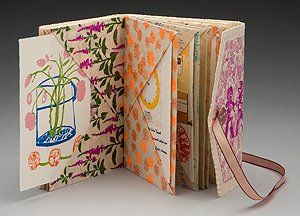 We are more than what we remember; we are all that we have made.
We are more than what we remember; we are all that we have made.Shu-Ju Wang, a Portland, Oregon painter and printmaker spent the last year working with four senior citizen women in various stages of memory loss. Together, through conversation, painting, printmaking and collage, they chronicled their lives through artful, evocative artist books. Get the full story here.
Learn more about Shu-Ju Wang here.
Small, delicious poem pleasure
 Sometimes I feel saturated. Too much stuff. Too many words.
Sometimes I feel saturated. Too much stuff. Too many words.
Which is why I love Four and Twenty, a short form poetry journal. The journal — edited by Vinnie Kinsella of Declaration Editing in Vancouver, Washington — presents poems of 20 words or less, in four lines or less. Small nugget poems. Bite-size and delicious.
I have three poems in the current issue, including a Poem of the Week featured right now. Go to the website here, and download the handy-dandy PDF for your poetry reading pleasure.
New, Old, Forgotten and Found
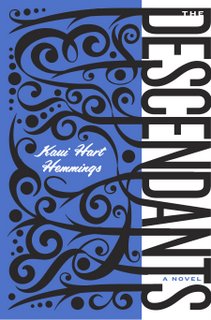 Last month’s post calling for book suggestions delivered some great additions to my list. With the holiday break, I settled into some good reads, including these:
Last month’s post calling for book suggestions delivered some great additions to my list. With the holiday break, I settled into some good reads, including these:
The Descendants by Kaui Hart Hemmings.
Sharp writing and painfully real characters make this story shine. In her debut novel, Hemmings deftly creates a smart and endearing story of a father forced to wake up — and take charge of his two daughters — in the midst of his wife’s death. The book is now being adapted for film, so read it quick before airbrushed actors glam up the grit of true emotion.
Bee Season by Myla Goldberg
I’m late to the party on this on this critically acclaimed and wildly popular book. Published in 2000 and later made into a movie (not to be confused with The Secret Life of Bees, an enjoyable book turned into a painfully sappy movie), Bee Season is snappy and sharp, and told in the voice of Eliza, a quirky 11-year-old pursuing the national spelling bee title.
Practicing for Heaven, by Julia B. Levine. I’ve waxed on about this contemporary California poet before but getting a Christmas gift of her early work reminds me that I can’t say enough about her ability to turn crisp pain into warm insight.
I didn’t want to like it, but I have to admit Prep by Curtis Sittenfeld is a good, engaging read. The story of a Massachusetts prep school initially made me groan. I mean, really, do we need another story of overindulged teens? But this story is smart, the characters are complex, and the book is a true page-turner. I read it in one sitting.
There are still a few days left in my self-declared and official Holiday Reading Season (wherein participants are allowed and encouraged to further the sport of reading by lazing about for hours, absorbed in books). I hope to enjoy — and in some cases, revisit — these books, too:
Gilead by Marilynne Robinson was suggested by reader Beth. Critics have hailed this book as brilliant, multi-layered and spiritually contemplative.
Just After Sunset by Stephen King
I’m a hit-and-miss fan but King’s new short story collection has garnered great reviews, and I’m eager for some bite-size reading. He’s so darn prolific (he’s written over 40 books) that over the years he’s gone beyond his trademark horror to offer a bit of something for everyone. My favorites are On Writing, a blend of memoir and manual, and Hearts in Atlantis, five thematically linked short stories set during the Vietnam War.
Unless by Carol Shields
Reader Auburn McCanta shared my enthusiasm for The Stone Diaries and couldn’t wait to read more of Shield’s work. Sadly, the author died of breast cancer in 2003. Unless, published in 2002, was her last novel. While she left us 10 novels, three short story collections and three volumes of poetry, I’m still hungering for more.
Birds of America by Lorrie Moore
Anything by this quick-witted writer is worth reading. She’s smart, tight and wry.
What’s on your library list? On your desk? By your bed? What's got you glued? I'd love to hear from you.
Poetry is back!
Thank you, Barack Obama, for bringing back the art of words. President-elect Obama has selected Elizabeth Alexander to compose and read a poem for his inauguration on Jan. 20.
Alexander will be only the fourth poet to be featured at a presidential inauguration. Robert Frost read at John F. Kennedy’s in 1961; Maya Angelou and Miller Williams read at Clinton’s in 1993 and 1997.
Alexander is an award-winning poet and professor at Yale University. She has written four books of poetry and was a Pulitzer Prize finalist in 2005 for her collection American Sublime. Last year, she won the $50,000 Jackson Poetry Prize.
Ars Poetica #100: I Believe
Elizabeth Alexander
Poetry, I tell my students,
is idiosyncratic. Poetry
is where we are ourselves,
(though Sterling Brown said
“Every ‘I’ is a dramatic ‘I’”)
digging in the clam flats
for the shell that snaps,
emptying the proverbial pocketbook.
Poetry is what you find
in the dirt in the corner,
overhear on the bus, God
in the details, the only way
to get from here to there.
Poetry (and now my voice is rising)
is not all love, love, love,
and I’m sorry the dog died.
Poetry (here I hear myself loudest)
is the human voice,
and are we not of interest to each other?
God is a vowel
 Paging through the dictionary is like looking through a microscope. Every word breaks down into parts with unique properties — prefix, suffix, root. Eliza gleans not only the natural laws that govern the letters but their individual behaviors. R, M, and D are strong, unbending and faithful. The sometimes silent B and G and the slippery K follow strident codes of conduct. Even the redoubtable H, which can make P sound like F and turn ROOM into RHEUM, obeys etymology. Consonants are the camels of language, proudly carrying their lingual load.
Paging through the dictionary is like looking through a microscope. Every word breaks down into parts with unique properties — prefix, suffix, root. Eliza gleans not only the natural laws that govern the letters but their individual behaviors. R, M, and D are strong, unbending and faithful. The sometimes silent B and G and the slippery K follow strident codes of conduct. Even the redoubtable H, which can make P sound like F and turn ROOM into RHEUM, obeys etymology. Consonants are the camels of language, proudly carrying their lingual load.
Vowels, however, are a different species, the fish that flash and glisten in the watery depths. Vowels are elastic and inconstant, fickle and unfaithful. E can sound like I or U. –IBLE and –ABLE are impossible to discern. There is no combination the vowels haven’t tried, exhaustive and incestuous in their couplings. E will just as soon pair with A, I, or O, leading the dance or being led. Eliza prefers the vowels’ unpredictability and, of all vowels, favors Y. Y defies categorization, the only letter that can be two things at once.
Before the bee, Eliza had been a consonant, slow and unsurprising. With her bee success, she has entered vowelhood. Eliza begins to look at life in alphabetical terms. School is consonantal in its unchanging schedule. God, full of possibility, is a vowel. Death: the ultimate consonant.
— from Bee Season, by Myla Goldberg
Hardy Boys inspiration
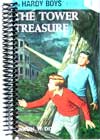 Pen, paper, journal. These are critical tools for writers, dreamers, artists, wanderers. . . . well, anyone, really.
Pen, paper, journal. These are critical tools for writers, dreamers, artists, wanderers. . . . well, anyone, really.
That’s why everyone should have a journal from Ex Libris Anonymous, a Portland, Oregon company recycling old books into quirky journal treasures.
Owner Jacob Deatherrage finds classic used books (Dr. Seuss and the Hardy Boys, for example). He keeps the retro covers but replaces the inside pages with blank sheets, perfect for writing or sketching.
Throughout the books, he retains cover pages, illustrations, library cards, maps and inscriptions that give a worn, warm vibe, and then he reassembles it all together with a black spiral binding. It’s fun! It’s genius! It’s art!
Each time I order a journal – and there are hundreds from which to choose --- I am selfless and giving. I purchase these gems with the best intentions, to gift them to all my friends. But, a few days later, when the journals arrive, I can’t bear to give them away. So clever! So crafty! So mine!
Get yours here.
Young Writers make the news
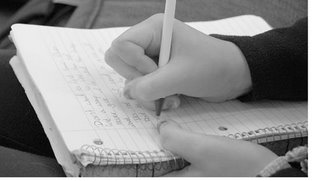 Yesterday I heard a poet say that writing is an act of redemption, and I couldn’t agree more.
Yesterday I heard a poet say that writing is an act of redemption, and I couldn’t agree more.
Again and again, writing has saved me. Writing offers small light when the darkness is deep, and provides solace and direction when the days are long and lonely.
The process of writing is wonderfully mysterious. Combining the physical (hand gripping pen) with the mental and emotional (mind unfurling) can produce powerful, unexpected results.
When Kimberley, a young woman in the teen writing group I lead, says, “Writing saved my life,” I recognize her gratitude and sigh with shared relief.
A short bit of her story, and the story of the Young Writers Group, made the news this week. The Newport News Times ran an article about our group (read it here), a program that has enjoyed such success that we’ve added reading and writing programs for younger students, too.
I’m grateful for these students who stretch my heart and sharpen my mind. And I’m thankful, too, for words that rise from darkness to offer light.
Automation for the People
Oh, the pleasures of automation! Now, you can savor every single word of this blog. Don't miss a moment, subscribe today.
Here's how: Go to the column on your right. Enter your email address, and click on 'Subscribe.'
Simple. Fill your mind with fresh, hot words today.
We are the music makers
 As surely as The Wizard of Oz hits the cable channels each October, Willy Wonka and the Chocolate Factory plays every Christmas season.
As surely as The Wizard of Oz hits the cable channels each October, Willy Wonka and the Chocolate Factory plays every Christmas season.
As a child, I liked the trippy 1971 film but as an adult I like the timeless movie even more. Watching Wonka last night, I’ve come to love Gene Wilder’s mocking nerve, and appreciate the zingers aimed at overindulged children and their pathetic parents. And I have finally have caught the shower of literary references.
The classic film is sprinkled with great words from Ogden Nash, William Shakespeare, Oscar Wilde, Arthur O'Shaughnessy, John Keats, and Lewis Carroll.
Proving that words really do produce ripples of influence, Willy Wonka is peppered with poetry from the past. In turn, Wonka went on to influence scores of new artists.
For example, the first lines of a poem by British poet Arthur O'Shaughnessy are spoken by Wonka:
Willy Wonka: "The strawberries taste like strawberries. The snozzberries taste like snozzberries."
Veruca Salt: "Snozzberries? Who ever heard of a snozzberry?"
Willy Wonka: "We are the music makers... and we are the dreamers of dreams."
Ode – once experienced in Willy Wonka -- went on to inspire countless creatives. The first two lines have been used as an album title for Joy Electric, and for a track by Aphex Twin. A New York band even dubbed itself We Are the Music Makers.
The O'Shaughnessy poem comes from the collection Music and Moonlight, published in 1874. Ode is often quoted, but rarely provided in its entirety.
Ode
Arthur O'Shaughnessy
We are the music makers,
And we are the dreamers of dreams,
Wandering by lone sea-breakers,
And sitting by desolate streams;—
World-losers and world-forsakers,
On whom the pale moon gleams:
Yet we are the movers and shakers
Of the world for ever, it seems.
With wonderful deathless ditties
We build up the world's great cities,
And out of a fabulous story
We fashion an empire's glory:
One man with a dream, at pleasure,
Shall go forth and conquer a crown;
And three with a new song's measure
Can trample a kingdom down.
We, in the ages lying
In the buried past of the earth,
Built Nineveh with our sighing,
And Babel itself in our mirth;
And o'erthrew them with prophesying
To the old of the new world's worth;
For each age is a dream that is dying,
Or one that is coming to birth.
A breath of our inspiration
Is the life of each generation;
A wondrous thing of our dreaming
Unearthly, impossible seeming—
The soldier, the king, and the peasant
Are working together in one,
Till our dream shall become their present,
And their work in the world be done.
They had no vision amazing
Of the goodly house they are raising;
They had no divine foreshowing
Of the land to which they are going:
But on one man's soul it hath broken,
A light that doth not depart;
And his look, or a word he hath spoken,
Wrought flame in another man's heart.
And therefore to-day is thrilling
With a past day's late fulfilling;
And the multitudes are enlisted
In the faith that their fathers resisted,
And, scorning the dream of to-morrow,
Are bringing to pass, as they may,
In the world, for its joy or its sorrow,
The dream that was scorned yesterday.
But we, with our dreaming and singing,
Ceaseless and sorrowless we!
The glory about us clinging
Of the glorious futures we see,
Our souls with high music ringing:
O men! it must ever be
That we dwell, in our dreaming and singing,
A little apart from ye.
For we are afar with the dawning
And the suns that are not yet high,
And out of the infinite morning
Intrepid you hear us cry—
How, spite of your human scorning,
Once more God's future draws nigh,
And already goes forth the warning
That ye of the past must die.
Great hail! we cry to the comers
From the dazzling unknown shore;
Bring us hither your sun and your summers;
And renew our world as of yore;
You shall teach us your song's new numbers,
And things that we dreamed not before:
Yea, in spite of a dreamer who slumbers,
And a singer who sings no more.
What silence brings
After all, most writing is done away from the typewriter, away from the desk. I'd say it occurs in the quiet, silent moments, while you're walking or shaving or playing a game, or whatever, or even talking to someone you're not vitally interested in."
I thought of you
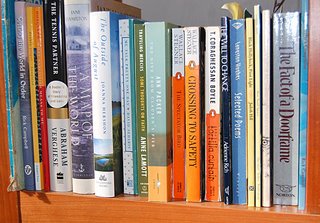 My hands are cold, my forehead clammy and my mind restless. I am showing signs of good book deprivation.
My hands are cold, my forehead clammy and my mind restless. I am showing signs of good book deprivation.
I raced through two books this long weekend. They were fine, pass-the-time books, but nothing that left me riveted, shaken, sated. I am desperate for a can't-put-it-down, move-me-to-tears, don’t-want-it-to-end book.
Earlier this month, a friend sent me a book. I thought of you, she said, and I wasn’t sure if she was referring to the title — Bad Girls – or the irony. It was entertaining, funny, and a bit naughty in a good-girl goes bad for a reckless moment kind of way. But most of all, I loved that Dee enjoyed a book and thought of me.
As Christmas approaches, I want to return the favor, give books that offer comfort, laughter, guidance and tears. Books that say I thought of you.
My booklist is chocked with turning-point reads that ignited my mind, expanded my perspective and left a mark on my heart. A few favorites include:
Traveling Mercies: Some Thoughts on Faith, by Anne Lamott
Irreverent and real, Lamott shares her spiritual journey without being at all preachy or "religious."
Writing Down the Bones, by Natalie Goldberg
The master of freewriting, Goldberg offers mental jumpstarts for writers.
Journal of a Solitude, by May Sarton
When I was younger and alone, Sarton's book affirmed my solitary choices. Nothing escapes her examination in these seemingly simple journal entries that reveal a rich interior life.
Refuge: An Unnatural History of Family and Place, by Terry Tempest Williams
A profound metaphor of change, blending mother-daughter dynamic with a powerful and shifting Utah landscape.
Comfort me with Apples, by Ruth Reichl
A touching coming-of-age memoir by the former editor of Gourmet magazine. Even for non-foodies, this is a great read.
The Stone Diaries, by Carol Shield
A Pulitzer Prize winning novel about one woman's life. It's not the details of Daisy's life that are so riveting, but the elegant and engaging prose that makes the story so beautiful.
There are more books, of course, but as I review the list I realize I have already gifted my favorite books over the years. I need new material and I’m taking suggestions.
What books have touched, lifted or altered your heart? your life? your path? I’m eager to dive into the next great read, to sink in and savor, and to pass it on with love.
Out of the forest
Years ago the question was this: If I write words that no one reads, am I really a writer?
Now, the question has a digital twist: If I write a blog that no one reads, am I really a writer?
“Real writers are those who want to write, need to write, have to write,” says writer/poet Robert Penn Warren.
If he is correct, a writer’s real concern is not with audience, approval and acknowledgement.
Still, the existential question of what makes a writer leads to the core of dilemma and doubt: Is anyone out there? Are we in the proverbial forest, where trees — and words — fall with a silent thud?
In this blog-age, writers are slicing the silence with long-winded whines of Read me!
It’s what every writer wants. It’s why millions of books line store shelves, why thousands of readings take place each week, and why there are zillions of blogs just like mine. Writers want to be heard, read — and here’s the greedy part — acknowledged.
See me. It’s the song of the times. And not just for writers.
It’s why 100 million people now use Facebook, and join MySpace, Twitter, LinkedIn and other social networks. We — myself included — spend countless hours distracting ourselves, stumbling through websites, sifting through blogs. We savor and sort, experience, extract, move on. We’re living in, as the New York Times says, a “brave new world of digital intimacy.”
And now the question expands: We’re all connected but to what depth?
When we share the mundane, as in Twitter’s moment-by-moment reportage and Facebook’s What are you doing right now? status reports (answer: “I am waiting for the bus”) do we really grow emotionally closer? Are we elevated, illuminated, entertained? Or do these moments of incessant contact simply increase our narcissism while distracting us from silence and reflection, the very things necessary to create books and poems and discourse to deepen our lives and counter the mindless chatter?
The genius behind Facebook, 26 year-old Mark E. Zuckerberg, has never known a world without caller ID, cellphones and Internet connection. Indeed, the young creatives driving technology today have always experienced the immediacy of online access, digital cameras and text messages. In this age of ‘digital intimacy’ genuine communication and deep connection may not be the point.
We've stepped out of the forest. We're all just screaming to be heard.
The Unwritten
Inside this pencil
crouch words that have never been written
never been spoken
never been taught
they’re hiding
they’re awake in there
dark in the dark
hearing us
but they won’t come out
not for love not for time not for fire
even when the dark has worn away
they’ll still be there
hiding in the air
multitudes in days to come may walk through them
breathe them
be none the wiser
what script can it be
that they won’t unroll
in what language
would I recognize it
would I be able to follow it
to make out the real names
of everything
maybe there aren’t
many
it could be that there’s only one word
and it’s all we need
it’s here in this pencil
every pencil in the world
is like this


